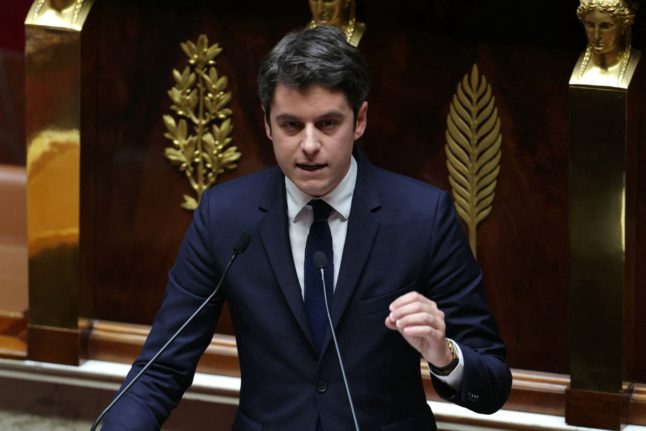Attal issued a stark view of the risks of failing to support Ukraine ahead of a symbolic vote in parliament on President Emmanuel Macron’s Ukraine strategy, as domestic tensions rage in the run-up to June’s European Parliament elections.
Macron’s camp has been seeking to hammer home the importance of greater support for Ukraine, which is running out of ammunition, insisting that Europe’s security is at stake.
Following a debate, the National Assembly lower house approved the government’s Ukraine strategy, including a bilateral security agreement signed by Macron and Ukrainian President Volodymyr Zelensky last month.
“Ukraine is watching us, waiting for the confirmation and signal of our unity behind them,” Attal told the chamber.
He added that “we are at a tipping point” in the conflict and that a Russian victory had “real, tangible dangers” for “everyday life for the French people”.
With the symbolic parliament vote, Macron forced political parties to take a public stance on the conflict as Russia’s invasion of Ukraine stretches into its third year.
The far-right Rassemblement National (RN), which leads Macron’s alliance by a wide margin ahead of the European elections, abstained. Meanwhile, the far-left La France insoumise (LFI) voted against.
Targeting the RN, Attal said ahead of the vote that “to abstain is to flee before your responsibility to history and to betray what is dearest to us”.
He signed off his opening speech with the Ukrainian battle cry of “Slava Ukraini”.
The upper house, the Senate, was set to hold similar debates on Wednesday.
LFI said it would vote “against war” and the possibility of Ukraine joining NATO and the European Union in the future.
Speaking for the RN, party figurehead Marine Le Pen attacked Macron’s “warlike announcements”, in reference to his not ruling out the sending of Western troops to Ukraine.
She also condemned European sanctions on Russian exports, “some (of which) have considerably weakened our economies”, and rejected the possibility of
Ukraine becoming a member of NATO and the EU.
The vote was designed so that “either we’re in favour of Macron, or we’re accused of being pro-Putin,” Le Pen charged, accusing the government of “hijacking, exploiting and instrumentalising a major international crisis for a short-term electoral agenda”.
Allies of Macron at the weekend lambasted the RN at the launch of their European election campaign, accusing the far-right party of flirting with the Kremlin and betraying the interests of France and Europe.
Macron is also set to speak about the war in a prime-time TV broadcast on Thursday.
But public support for France’s continued aid for Ukraine is waning, according to some pollsters.
An Elabe poll released on Sunday showed that 39 percent of French people support France’s continued economic and financial aid for Ukraine, 11 percentage points down from June 2023.
Just 14 percent of French people believe France should ramp up military aid for Ukraine according to the study.
Macron emphasising that his ruling party is prepared for war with Russia is a “risky bet” ahead of the elections, the Eurointelligence think tank said.
It added that Macron’s “narrow focus” on the RN made his party an “easy target” for others.
Macron’s hardened stance represents a turnaround for a leader who had for years sought to position himself as a top mediator between Russia and Ukraine.
Speaking to French broadcaster BFM TV on Monday, Ukrainian leader Zelensky said there was no need for French ground troops in his war-torn country as
long as “Ukraine holds”.
“Your children are not going to die in Ukraine,” he said.



 Please whitelist us to continue reading.
Please whitelist us to continue reading.
Member comments